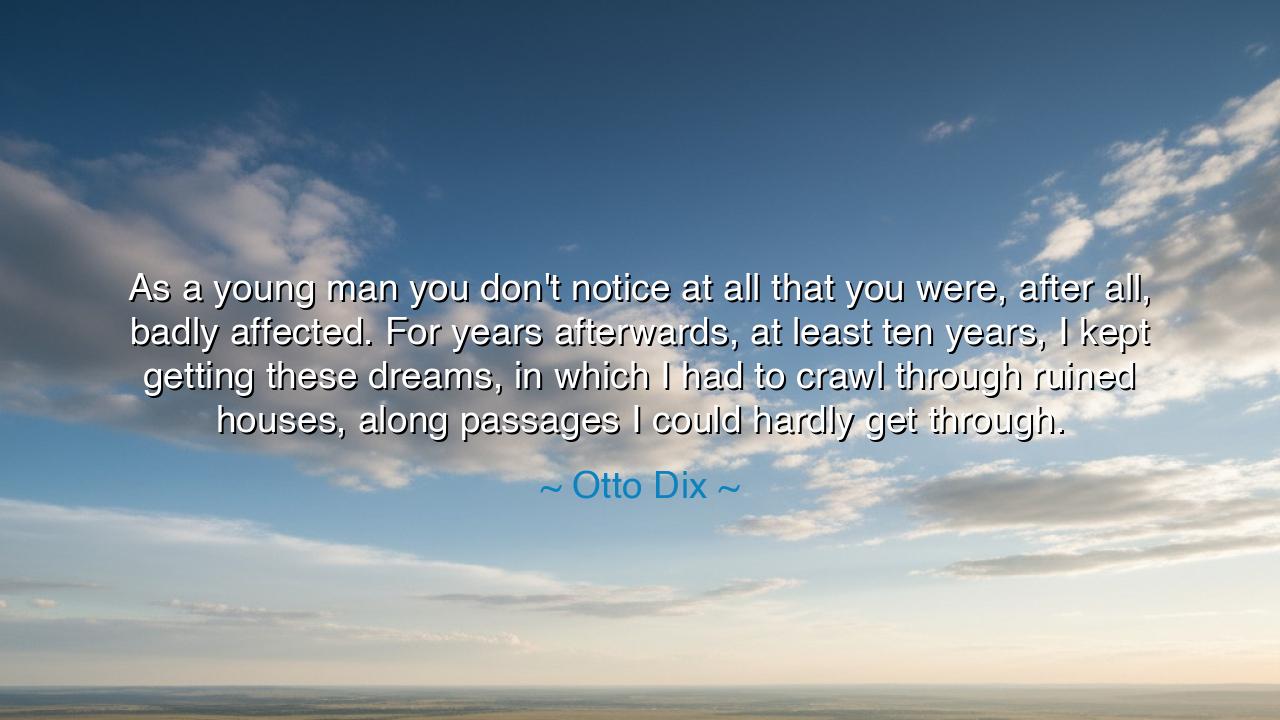
As a young man you don't notice at all that you were, after all
As a young man you don't notice at all that you were, after all, badly affected. For years afterwards, at least ten years, I kept getting these dreams, in which I had to crawl through ruined houses, along passages I could hardly get through.






The words of Otto Dix, painter of truth and witness to the ruin of war, strike the soul with the quiet terror of memory: “As a young man you don’t notice at all that you were, after all, badly affected. For years afterwards, at least ten years, I kept getting these dreams, in which I had to crawl through ruined houses, along passages I could hardly get through.” In this confession, Dix does not speak merely of himself — he speaks for an entire generation broken beneath the weight of conflict. His words reveal the invisible wounds of the spirit, the scars that time and silence cannot erase.
Dix was a soldier in the First World War, a witness to the chaos that swallowed Europe in fire and mud. He returned home with medals upon his chest and nightmares in his soul. In his paintings, he did not depict heroes in glory, but men twisted by suffering, faces haunted by death, landscapes filled with corpses and shattered cities. To many, such art was unbearable. Yet Dix painted not for comfort, but for truth. For he knew that though the body heals, the mind remembers. His quote comes from that deep remembering — from the long years when the battlefield followed him into his sleep, when the war had ended on the earth but continued within his heart.
The ruined houses of his dreams are symbols of more than shattered walls. They are the wreckage of innocence, the crumbling of meaning that war leaves behind. The narrow passages through which he crawled were not made of stone, but of memory — the tight, suffocating corridors of trauma through which the soul must drag itself, seeking light but finding only dust. Dix’s words remind us that even when peace returns to nations, it may not return to those who fought for it. The young man, filled with pride and strength, often believes himself untouched by horror. But the older man awakens in the night, and finds the battlefield waiting behind his closed eyes.
This truth has echoed across ages. When Odysseus returned from Troy, he found that home itself was no longer home. The battles he fought had seeped into his soul. Though the bards sang of his cunning and valor, they did not speak of his silence — of the long nights by the hearth when he stared into the fire, seeing not warmth, but the burning of the city he once conquered. Like Otto Dix, he had to crawl through the ruins within himself before he could truly return. War had not only changed the world; it had changed the man.
The wisdom of Dix’s words, therefore, is not bound to soldiers alone. Every human being, in one way or another, walks through the ruins of their own experience. We endure loss, failure, grief — and at first, we think we are unshaken. We tell ourselves we are strong. But years later, the dreams return — not of battlefields perhaps, but of broken moments, of corridors we could not escape. It is then we learn that to be human is to carry both survival and sorrow, and that true strength lies not in forgetting, but in facing the ruins within.
The lesson that Otto Dix gives to us is one of deep compassion: we must not deny the unseen wounds, neither in ourselves nor in others. When we meet those whose tempers seem strange, whose hearts seem heavy, we should remember that they may still be crawling through their own destroyed houses. Healing takes years, sometimes a lifetime, and understanding is its first medicine. We must listen, speak, paint, write, pray — whatever brings the hidden agony into the open air of honesty. For in silence, wounds fester; in expression, they begin to close.
And so, let this teaching be remembered: youth may rush headlong into struggle, believing itself immortal, but age will teach that no one walks through fire unscathed. Trauma is not weakness; it is the price of having lived deeply. The wise do not flee from their ruins — they rebuild them, stone by stone, until the dream becomes a home again. Be gentle, then, with your heart and with the hearts of others. For as Otto Dix shows us, even long after the battles end, the soul still seeks its way out of the ruined passages of memory — and it is only through patience, courage, and truth that it finds the light again.






AAdministratorAdministrator
Welcome, honored guests. Please leave a comment, we will respond soon